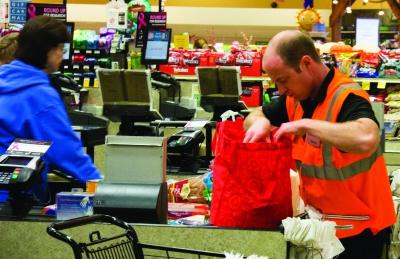Environment club makes progress on ban, successfully petitions city council
April 7, 2016
 Chase Tibbles/Observer
Chase Tibbles/Observer
When James King wants to prove a point, he prefers to do it literally. For the past two quarters, King would dress up in a suit made of hundreds of plastic bags and trounce around campus, talking to people about the environment, or pausing to pose for a photo.
The idea was to show people how much plastic ends up in the local environment from plastic bags given out at local retailers.
He quickly became known as the “plastic bag man,” and together with a local environmental club, Our Environment, King and crew were successful in petitioning Ellensburg’s City Council to look into some sort of measure on limiting plastic bag use in Ellensburg.
On March 8, they got their wish. The city council voted to look into some sort of measure on plastic bags – whether it’s an outright ban, or a tax and fee structure.
If enacted, Ellensburg would join about a dozen other Washington cities that have passed some sort of ordinance or legislation limiting or banning plastic bag use.
“I was happy to see them talking about it,” said King, who became a member of Our Environment last June. He’s currently pursuing a degree in anthropology at Central, with a minor in environmental studies.
Following the March 8 meeting, city council members tapped City Attorney Terry Weiner to research other municipalities’ actions on plastic bags. According to Weiner, the council was interested in imposing a fee or tax on both plastic and paper bag use, with a higher amount on plastics.
Other cities often use this fee to pay for environmental projects, or as is the case for Washington D.C., local cleanup projects in rivers and streams.
“Some cities use it for educational outreach and for middle matters,” Weiner said. “Other cities use it to increase recycling efforts. Usually, it has some sort of connection, either to plastic bags, trying to clean up the environment, or education, or some other use to protecting the environment.”
City Mayor Rich Elliott was personally interested in the idea of a tax for this very reason.
“I’d like to see the money going to commercial recycling,” Elliott said. “If what I proposed passes, the city will have money to give to recycling.”
Despite many cities across Washington requiring their citizens and businesses to recycle, Ellensburg does not. In fact, Elliott said commercial businesses in the downtown sector don’t have access to recycling at all, but if the fee or tax passed, commercial recycling would be one of the first projects on the horizon.
Which is also why, Elliott said, he opposed an outright plastic bag ban, like the same sort found in Seattle, which outlawed plastic bags in 2012. Our Environment’s original letter which was sent to the council four months ago, advocated for an outright ban, but the group has since been in support of working with the city on any sort of matter that would reduce waste.
Aside from not having a tax to generate funds, Elliott said he didn’t support a ban for many reasons. One was because convenience stores aren’t really set up for paper bags, and people don’t often bring reusable bags when stopping for gas or snacks.
He also said that, based on the city council’s research into the matter, outright bans on plastic bags don’t have the positive effect that people think they do.
“A ban created other kinds of issues,” he said. “It does reduce litter, but it doesn’t reduce the amount of waste going into streams. If you’re trying to get people to change their behavior, a fee or tax route seems to have some success.”
If things go as planned, City Attorney Weiner should have plans and recommendations drafted for the council by May 2. Elliott said any type of ordinance and plan could be adopted as early as the first meeting in June, but that’s best case scenario.
As for Our Environment and James King, the plastic bag suit has since been retired for the time being. But that’s not to say the group isn’t paying attention.
“Even though we didn’t get our way, it is moving towards a positive direction,” King said. “It’s at least causing dialogue.”

